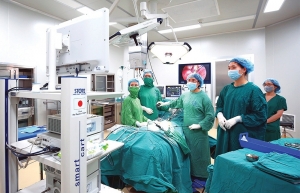Healthcare gains in reach through suitable research
In early March, Mekong Capital announced that Mekong Enterprise Fund IV has become a shareholder of TNH Hospital Group, one of the pioneering private hospital systems.The deal marks Mekong Capital’s first hospital investment in Vietnam with a view to increasing access to high-quality yet affordable healthcare across the country.
Based in the northern city of Thai Nguyen, TNH Hospital Group has expanded its hospital system in multiple locations after over a decade of development. The group boasts three hospitals, including 700 licensed hospital beds and over 800 staff.
Chad Ovel, partner of Mekong Capital, said it has examined numerous previous hospital investment opportunities over the past 15 years but ultimately passed on those opportunities for various reasons.
“What makes TNH Hospital Group particularly attractive to Mekong Capital is the company has a clear long-term growth strategy of building new hospitals in new catchment areas. They have a track record of executing such growth, with the recent opening of their third hospital in 2024 and a fourth hospital currently under construction. Among the key drivers for the growth of the private hospital sector in the coming decade include more widespread adoption of private health insurance and an ageing population in Vietnam,” he said.
In February, Singapore’s wealth fund GIC poured $135 million into Nhi Dong 315 under 315 Medical, bringing the total investment to nearly $200 million. Nhi Dong 315 is a paediatric and maternity clinic chain under 315 Medical.
This investment not only bolsters 315’s potential financing but also demonstrates the confidence of international investment funds in its growth potential. Leverage GIC’s extensive experience in healthcare investment, the collaboration will help 315 Medical improve service quality, expand scale, and apply modern technology to examinations and treatment at its clinic system.
Vietnam-based healthcare clinic chain FDcare has secured $2.5 million in Series A funding led by Singapore venture capital firm Golden Gate Ventures and US-based Cercano Management, with participation from existing investors Center Back Capital and AiViet Venture.
FDCare is pioneering a comprehensive primary care model that integrates preventive screening, personalised consultation, treatment, chronic disease management, and end-of-life care. The fresh funding will fuel expansion into multiple new locations and the diversification of its service offerings.
The growing willingness of Vietnamese consumers to pay out-of-pocket for healthcare and purchase private health insurance coverage is a key trend that will continue to promote growth of funding into private hospitals and healthcare clinics.
According to the World Health Organization, total healthcare expenditures in Vietnam will grow from $2 billion in 2020 to $34 billion in 2025. Over that same period, out-of-pocket and private health insurance is likely to grow from 42 per cent of total healthcare expenditure in 2020 to 66 per cent in 2025. Furthermore, with rising health awareness, patients are set to shift to private healthcare services for convenience, better services, and availability of good doctors.
Le Minh Phieu, founder of LMP Lawyers, said healthcare is becoming increasingly attractive to foreign investors, particularly in hospital chains and speciality clinics.
“A large population, an ageing demographic, rising income levels, and greater awareness of quality healthcare are driving demand for private medical services,” Phieu said. “At the same time, government policies actively encourage private and foreign investment, creating a favourable regulatory environment. With public hospitals often overcrowded and lacking specialised care, private providers have significant opportunities to fill these gaps.”
Additionally, Vietnam is emerging as a medical tourism destination, benefiting from competitive pricing and improving standards. These factors make assets, especially hospital chains and speciality clinics, an appealing long-term investment opportunity, Phieu said.
According to the latest report from PwC, the healthcare merger and acquisition landscape in Vietnam for the rest of 2025 is expected to be vibrant, driven by increasing demand for high-quality healthcare services and a rapidly expanding middle class. Private hospitals and speciality clinics, such as ophthalmology and oncology centres, will be the primary drivers of dealmaking activity.
Phieu added that foreign investors in Vietnam’s healthcare sector look beyond market fundamentals, prioritising a stable regulatory environment, strong local partnerships, and scalable healthcare assets.
“They assess profitability through insurance coverage and reimbursement models while also valuing technology adoption, such as telemedicine and AI-driven diagnostics,” he said. “The availability of skilled medical professionals is crucial, as is the sector’s potential and clear exit strategies. These factors, alongside rising healthcare demand, make Vietnam an attractive investment destination.”
Ovel of Mekong Capital added, “For investors looking to acquire or invest in Vietnamese private hospitals, I would recommend carefully studying affordability of pricing for patients; incumbent competition in the immediate catchment area; the company’s ability to recruit and retain professionals; and unit economics, particularly given the high capital expenditure required to build a hospital to required standards.”
 | Digital health must reach further ground Although digital transformation in healthcare is covering more bases than ever, its implementation remains slow in various aspects. |
 | PM calls for bold policies to drive education, healthcare development Prime Minister Pham Minh Chinh ordered breakthrough policies to revolutionise the education and healthcare systems, and establishing a dedicated task force to review existing policies. |
What the stars mean:
★ Poor ★ ★ Promising ★★★ Good ★★★★ Very good ★★★★★ Exceptional
Themes: Healthcare Platform
- Hanoi intensifies airport monitoring amid Nipah disease risks
- Cosmetics rules set for overhaul under draft decree
- Policy obstacles being addressed in drug licensing and renewal
- Sanofi, Long Chau Pharmacy relaunch medicine blister pack collection initiative
- Takeda Vietnam awarded for ongoing support of Vietnam’s sustainability efforts
Related Contents
Latest News
More News
- State corporations poised to drive 2026 growth (February 03, 2026 | 13:58)
- Why high-tech talent will define Vietnam’s growth (February 02, 2026 | 10:47)
- FMCG resilience amid varying storms (February 02, 2026 | 10:00)
- Customs reforms strengthen business confidence, support trade growth (February 01, 2026 | 08:20)
- Vietnam and US to launch sixth trade negotiation round (January 30, 2026 | 15:19)
- Digital publishing emerges as key growth driver in Vietnam (January 30, 2026 | 10:59)
- EVN signs key contract for Tri An hydropower expansion (January 30, 2026 | 10:57)
- Vietnam to lead trade growth in ASEAN (January 29, 2026 | 15:08)
- Carlsberg Vietnam delivers Lunar New Year support in central region (January 28, 2026 | 17:19)
- TikTok penalised $35,000 in Vietnam for consumer protection violations (January 28, 2026 | 17:15)

 Tag:
Tag:


















 Mobile Version
Mobile Version